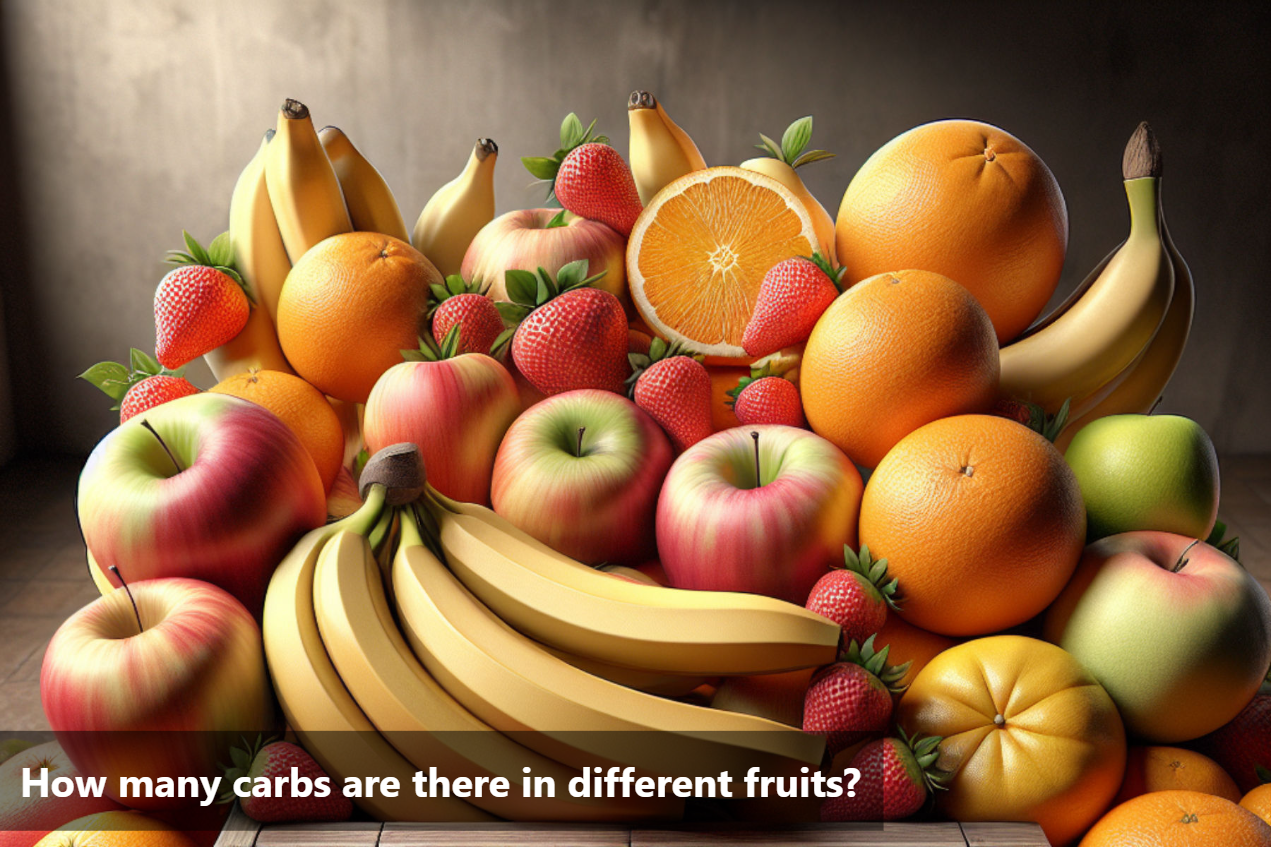
How many carbs are there in different fruits?
Understanding the carbohydrate content in fruits is essential for making informed choices to support a healthy lifestyle. Fruits contain natural sugars, fibre, and other essential nutrients that contribute to overall well-being.
When considering the carbs in fruits, it is important to distinguish between simple and complex carbohydrates. Simple carbohydrates are found in fruits like bananas and grapes, providing a quick energy boost, while complex carbohydrates in fruits like apples and berries offer sustained energy release.
One way to track the carbohydrate content in fruits is by referring to a carbs in fruit chart. This chart can help individuals manage their carbohydrate intake effectively, especially for those monitoring their blood sugar levels or following a specific dietary plan. Understanding the role of carbs in fruits sets the foundation for making informed choices that promote a balanced and nutritious diet.

Common Fruits and their Carbohydrate Content
Fruit |
Serving Size |
Fibre (grams) |
|---|---|---|
Grapes |
1 cup / 151g |
26 |
Banana |
1 medium |
24 |
Pear |
1 medium |
22 |
Apple |
1 medium |
21 |
Pineapple |
1 cup / 165g |
20 |
Blueberries |
1 cup / 148g |
17 |
Oranges |
1 medium |
12 |
Kiwi |
1 medium |
9 |
Strawberries |
1 cup / 144g |
8 |
Lemon |
1 fruit |
6 |
Fruits with Low Carbohydrate Content
When it comes to maintaining a low-carb diet, choosing the right fruits can make a significant difference. Incorporating fruits that are low in carbohydrates can help individuals manage their carb intake effectively while still enjoying the natural sweetness of fruits.
One excellent choice for individuals watching their carb intake is berries. Berries such as strawberries, raspberries, and blackberries are not only delicious but also low in carbohydrates, making them ideal for a low-carb diet. These fruits can be enjoyed fresh or added to yogurts and smoothies for a tasty treat.
Another fruit to consider for a low-carb diet is avocados. Avocados are unique in that they are low in carbs but high in healthy fats, making them a satisfying and nutritious choice. Whether eaten on their own, mashed into guacamole, or added to salads, avocados are a versatile fruit that can enhance any meal.
-
Additionally, citrus fruits like lemons and limes are low in carbohydrates and can add a refreshing tangy flavour to dishes and beverages. Including these fruits in your diet can provide essential nutrients without significantly increasing carb consumption.
Incorporating fruits low in carbohydrates like berries, avocados, and citrus fruits can be a delicious and healthy way to maintain a low-carb diet while still enjoying the many benefits that fruits have to offer.
Fruits with High Carbohydrate Content
Identifying fruits that are high in carbohydrates is essential for individuals conscious of their carb intake. While fruits are generally nutritious, some may contain higher levels of carbohydrates than others, making moderation key for those following a low-carb diet.
When considering fruits with high carbohydrate content, it's important to be aware of options that can impact blood sugar levels more significantly. For instance, fruits like bananas, grapes, and mangoes tend to have a higher sugar content, leading to a higher carb count. These fruits can still be part of a balanced diet but may need to be consumed in moderation, especially for individuals closely monitoring their carbohydrate intake.
Monitoring the portion sizes of high-carb fruits is crucial as it can help in regulating overall carb consumption. Opting for smaller servings of high-carb fruits can still provide essential nutrients without significantly spiking blood sugar levels. Integrating these fruits with lower-carb options can aid in maintaining a varied and balanced diet.
Incorporating high-carb fruits mindfully, in conjunction with other nutrient-dense foods, allows individuals to enjoy a diverse range of flavours while managing their carbohydrate intake effectively. By being mindful of the carbohydrate content in fruits, individuals can make informed choices that align with their dietary preferences and health goals.
Creative Ways to Add Variety with Fruits in Your Daily Diet
Items |
Steps |
|---|---|
Fresh Fruit Snacks |
|
Smoothies and Juices |
|
Fruit Salads |
|
Oatmeal or Cereal Toppings |
|
Fruit Yogurt Parfaits |
|
Grilled or Roasted Fruits |
|
Fruit Salsas and Chutneys |
|
Baked Goods and Desserts |
|

Exploring Carbs in a Variety of Fruits
Incorporating a variety of fruits in your daily meals can provide a range of essential nutrients along with carbohydrates. To maintain a well-rounded and balanced diet, consider referring to a carbs in fruit chart or nutritional information to make informed choices about the fruits you include in your meals.
By diversifying your fruit intake, you can ensure a nutrient-rich diet that supports overall well-being. From vitamins and minerals to fibre and antioxidants, different fruits offer unique health benefits, making them valuable additions to your diet. Experiment with different fruits in salads, smoothies, snacks, and desserts to enjoy a colorful and flavorful array of options while nourishing your body
This Blog post is an initiative by Lo! Foods, to provide accurate and Nutritionist / Doctor approved information related to Health. Lo! Foods is India's leading brand for Everyday Functional Foods. Foods designed for specific Health conditions or Needs. Lo! Foods also runs India's largest range of Low Carb Healthy Cloud Kitchens, under the brand names of Lo!, ProteinChef, ATH (All Things Healthy) and DiabeSmart.















Leave a comment
Your email address will not be published.